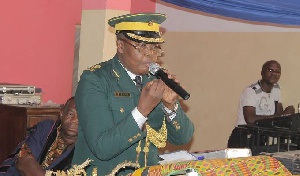Eric Afari, Northern Regional Commander of the Ghana Immigration Service (GIS), has appealed to the Service’s hierarchy to expedite action on officers’ grievances to enable them operate in a congenial environment befitting its status.
“The GIS is the only security agency in the region without a staff-bus, which is adversely affecting the operations and morale of officers,” he said, adding that “the Northern Command of the GIS is faced with lack of accommodation and offices at the region’s various entry points.”
The Regional Commander made this known when the board of GIS, led by its Chairman Cletus Avoka, paid a courtesy call on the Northern Regional Command and its officers in Tamale.
Assistant Director of Immigration (ADI) Afari also commended the board of GIS for its tremendous efforts in transforming and repositioning the service.
He said the efforts made in ensuring passage of the new immigration law will empower officers to bear arms in protecting the country’s points of entry, and also help them discharge their duties efficiently to enable government generate revenue from import activities into the country.
Mr. Avoka assured the officers of the board’s commitment in helping to address their grievances.
The board chairman said passage of the new immigration law is to allow immigration officers manning the country’s borders to wield arms, and therefore the board will ensure training and retraining for personnel to enable them handle weapons effectively.
He urged officers and men of the GIS to be professional and disciplined in the discharge of their duties, since the Service play crucial role in ensuring sanity in the country.
Mr. Avoka encouraged personnel of the Service to work hard and aspire to higher echelons of the service, since government has desisted from appointing personnel from the other security services as Directors of Immigration.
The new Director of Immigration, Felix Yaw Sarpong who was part of the team, expressed his optimism that efforts will be made to address grievances of personnel in the region so they can discharge their duties well
He recommended the personnel to have a totally transformational attitude toward work, and provide professional service to the Service’s clients.
He said the practice whereby some officers collect payments from ‘clients’ in the clear sight of civilians gives a very bad impression to the ordinary onlooker, who is of the opinion that some corruption is taking place in the Service, and advised them to desist from such conduct to avoid tarnishing the Service’s image.
Mr. Sarpong advised personnel to treat every client with professionalism, and extend to them all the care, kindness and understanding they can muster to leave a good impression in their minds about the country.
Regional News of Tuesday, 23 February 2016
Source: B&FT Online













